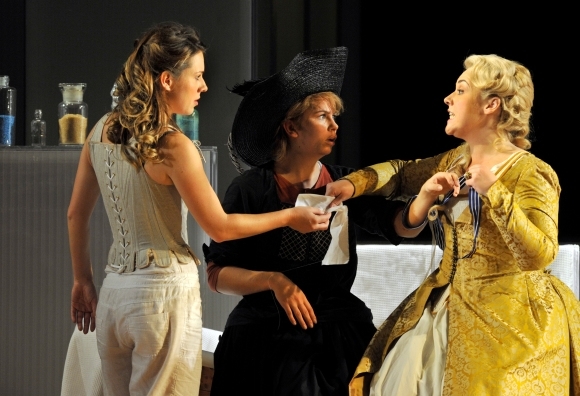The Marriage of Figaro (London Coliseum)

© Robbie Jack
Fiona Shaw has returned to restage her 2011 Figaro with a marvellous cast of youthful principals. Hers is one of the wittiest yet most compassionate and human productions of Mozart’s masterpiece I can recall. Rude humour dominates, particularly in the blissful Cherubino scenes (Samantha Price is, forgive the pun, priceless as the priapic youth whose hormone-popping body constantly gets the better of him), but there’s also a rare sensation throughout the opera that we’re watching real people grappling with their unreal situations.
Baffled as I am by Peter McKintosh‘s design materials – what’s with the cheap office plastic? – his versatile revolving set provides Shaw with all the corners and cubby holes she needs for her smart, fast farce. Factor in a sparkling translation by Jeremy Sams and you’re halfway to paradise; add Mozart’s sublime score, superbly executed, and you’ll think you’ve gone to heaven. Well, almost. There are tiny niggles along the way (Jean Kalman‘s lighting is too moody for a comedy; Jonathan Best struggles with Bartolo’s buffo patter) but they are insignificant amid so many delights.
'Fiona Shaw draws on her depth of experience as an actor to enrich the production'
Benedict Nelson‘s Count Almaviva, all floppy hair and fulmination, is given prominence in a production that seems happy to emasculate most of the male characters, not just the cross-dressing page boy. This talented baritone, who has a beautiful but not especially penetrating timbre, shows greater dramatic range than I remember at previous encounters, even when Shaw runs him through a comic actor's wringer.
His colleagues make for an impressive roll-call too. Sarah-Jane Brandon is a touching Countess, charming in her two great arias, while Lucy Schaufer presents a hyperactively hilarious Marcellina, Colin Judson a creepily Mime-like Don Basilio and Ellie Laughrane a feisty Barbarina.
As the eponymous hero, David Stout excels in a role that seems to interest the director slightly less than some of the characters around him, although she does equip him wish a shaving brush and razor from time to time. (Figaro used to be a barber, you know.) But above all it is Mary Bevan who shines like the star she has lately become, lending an inner calm to the quick-thinking Susanna and phrasing her fourth-act aria with exceptional beauty. Small wonder that she stepped forward to receive a Critics’ Circle Award (for ‘exceptional young talent’) at the final curtain.
Jaime Martin conducts a sleek, well-judged account of the score, perhaps a little low on detailed articulation for some tastes but on its own terms very sensitive, while Fiona Shaw draws on her depth of experience as an actor to enrich the production at every turn. My personal highlight from a special evening? Cherubino’s gauche moment of self-consciousness before his great act two aria, so handshakes to Shaw for imagining it and to Samantha Price for delivering it so sweetly. The old eye leaked a bit, I don’t mind saying.










